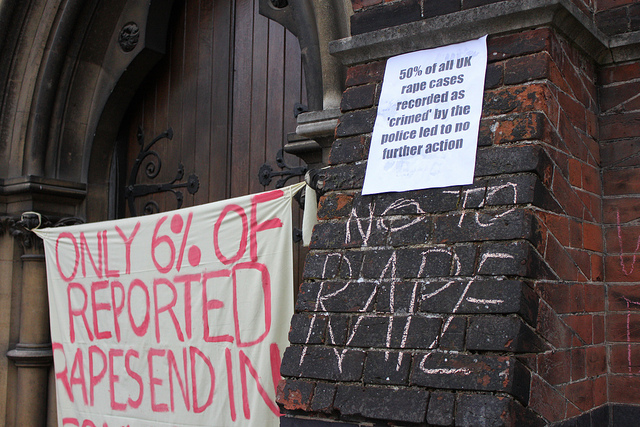[CN: Sexual assault etc.]

Last year, the idea of affirmative consent was first put into place by some US college campuses. This sparked a lot of discussion, some good and some, ahem, “sub-optimal”. Maybe we’ll remember 2014 as the year of the rape singularity that signalled a change in the way culture and law treat rape. As expected, a lot of conservatives were absolutely outraged. The main arguments being that this allegedly erodes due process for the defendant, that it turns the presumption of innocence into a presumption of guilt, that it is unrealistic and that it could criminalise most sexual encounters.
I don’t think the sky is falling, so I’ll try to explain what a legal and social culture of affirmative consent would look like. The whole post is not referring to any specific legal system, so much of this might already be reality in some systems.
From the point of view of the law, affirmative consent would mean that it is the legal responsibility of each participant in a sexual activity to obtain meaningful consent from all others. Basically if you’ve had sex with someone and haven’t obtained consent, you have then committed rape. Now, I’d imagine most statutes are written in language similar to the above, but in practice there is a lot of cultural (and some legal) precedents for the “they didn’t say no” defence. In an affirmative consent paradigm, this would be right out. Not saying no, not struggling and so on would not be taken as a sign of consent.
I don’t think this should be in any way controversial. However, there are occasionally cases where people claim that it wasn’t rape because the victim was passed out, the culture has leaps and bounds to go. As an aside, this gives us an answer to the question of “won’t this criminalise most sexual encounters?” Having sex without obtaining consent is rape. So if most sexual encounters don’t pass that test, then most sexual encounters would be rape. Meaning that there is –– gasp –– a huge amount of work to be done to establish a culture of consent. The wide scope of rape under this definition is not a reason to change it. And I’m sure you can think of historical and modern settings where most sex was in fact rape, because for example women could not say no in a meaningful way. The solution is not to relax the definition.
So, legal aspect isn’t hard. How this would play out in a trial is a separate issue though. The presumption of innocence basically means that for each crime, there are certain elements that the jury must prove. (I think the word “prove” is misleading since it brings in mind some objective, almost mathematical standard. In reality it’s “convince a judge or jury”.) If they aren’t able to convince the relevant people of the elements of the crime, the defendant is not convicted, hence the default is innocence.
How would this work for a rape case if we take affirmative consent seriously? There would basically be two elements of the crime: (1) the occurence of some form of sexual contact and (2) the lack of affirmative consent by the victim.
Now, let’s say the case revolves around (1), ie. whether the sexual activity actually happened. The presumption of innocence is not damaged since the prosecution needs to bring evidence that this in fact happened (which of course can include the victim’s testimony). If they don’t or if the jury thinks it’s even odds that this actually occurred, they cannot convict. Presumption preserved.
Onto the other case, where the debate is around (2). Here, there is likely to be a lower burden than for a legal system that does NOT include affirmative consent in the definition. Which I don’t see why anyone who acknowledges the serious issues faced by rape victims and the low studied rates of false accusations would take issue with. Either way, it’s still a burden the prosecution must meet. Without affirmative consent, a person’s legal obligation would just be to stop sex if the other person(s) say no. This opens the prosecution up to having to show that the victim said no, in an “appropriate” way (#rapeculture). It also opens up a whole debate about mens rea or whether the defendant believed they were committing a crime. Meaning, were they aware the victim said no or stop? In such a legal paradigm we can see how easy it is for victim-blaming to arise during a trial. Did you express your no forcefully enough? Did you do anything that could have given the defendant the impression that you were not non-consenting? (Now there’s a double-negative whammy.)

With affirmative consent, the defendant’s impressions matter a helluva lot less. The defendant has a legal obligation to ensure consent has been obtained. Now I imagine the prosecution would still have to show that they were negligent. But given that a lot of the evidence in rape trials would be testimony, the victim’s testimony that they did not give affirmative consent would be enough to reach this burden, in which case it would be prudent for the defence to provide any contradictory evidence. So yes, there may be plenty of cases where the defendant would need to show that there was affirmative consent but as you can see here, presumption preserved.
Since a lot of cases are oral testimony against oral testimony, often the distinction between a trial in an affirmative consent context and one in a more “standard” context will be subtle. But even then, it is important since the legal system isn’t actually objective in the sense of being divorced from culture. The notion of considering what’s a “reasonable” interpretation of (say) various consent signals is just one of the ways in which our culture’s victim-blaming biases get encoded into the norms that play out in trials. Affirmative consent would change the framework and hopefully alter the norms. I think this would be its most important outcome if it happens, over and above any influence on specific cases.
So there you have it. You need to get consent before having sex. Legally, this means you would have an obligation to make sure you have consent. You would also have the moral obligation since this means you get to know that you’re not raping someone. Finally if it’s established that affirmative consent was not given, you may be in legal trouble which still wouldn’t have overturned your presumption of innocence. It’s not that hard.
One last disclaimer. This whole post is about affirmative consent as a legal framework. I don’t want to imply that rape as a social problem, crime and scourge of humanity has a carceral solution. If anything, trying to focus on the police, courts etc can just reinforce some of the problems. But since the legal angle is unlikely to go away, let’s do it properly.





0 Comments